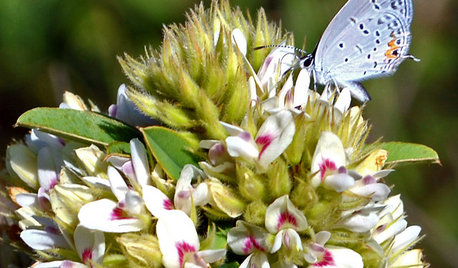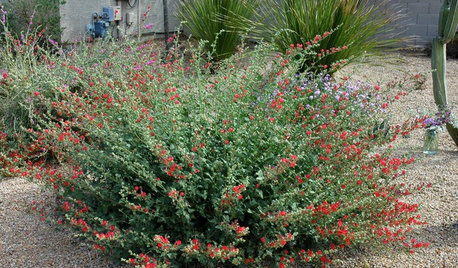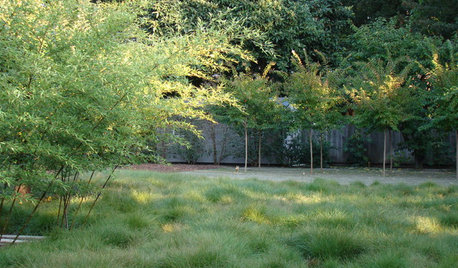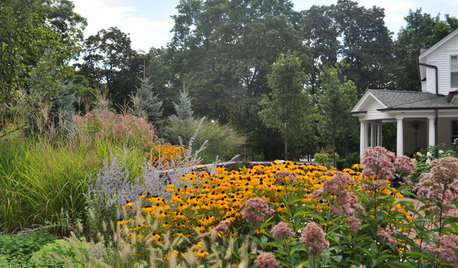Compost vs artificial fertilizer
greenskin
14 years ago
Related Stories

GARDENING GUIDESGet on a Composting Kick (Hello, Free Fertilizer!)
Quit shelling out for pricey substitutes that aren’t even as good. Here’s how to give your soil the best while lightening your trash load
Full Story
LANDSCAPE DESIGN10 Ways to Use Artificial Turf Where It Actually Looks Good
Fake grass is not for everyone, but it can be a problem-solver on balconies, on driveway strips and in urban courtyards
Full Story
GARDENING GUIDESHow to Keep Your Citrus Trees Well Fed and Healthy
Ripe for some citrus fertilizer know-how? This mini guide will help your lemon, orange and grapefruit trees flourish
Full Story
GARDENING GUIDES5 Prairie Wildflowers That Can Heal Your Soil
Get free, organic soil fertilizer with nitrogen-pumping plants that draw pollinators too
Full Story
GARDENING GUIDESHow to Switch to an Organic Landscape Plan
Ditch the chemicals for a naturally beautiful lawn and garden, using living fertilizers and other nontoxic treatments
Full Story
GARDENING GUIDESCommon Myths That May Be Hurting Your Garden
Discover the truth about fertilizer, soil, staking and more to keep your plants healthy and happy
Full Story
GARDENING GUIDESSouthwest Gardener's February Checklist
Orange you glad for a citrus-fertilizing reminder? And don't forget the recommended doses of vegetable seeds and cold-hardy flowers
Full Story
LANDSCAPE DESIGNA Guide to the Grasses Available for Nontraditional Lawns
New grass mixes are formulated to require less water and less fertilizer
Full Story
GARDENING GUIDESPacific Northwest Gardener: What to Do in September
Put in cool-weather veggies, fertilize your lawn and tidy the garden this month before chilly weather arrives
Full Story
GARDENING GUIDESHouzz TV: Make a Worm Bin for Rich Soil and Happy Plants
A worm-powered compost bin that can fit under a sink turns food scraps into a powerful amendment for your garden. Here’s how to make one
Full StorySponsored
Your Custom Bath Designers & Remodelers in Columbus I 10X Best Houzz
More Discussions







ericwi
sfallen2002
Related Professionals
Ashburn Landscape Architects & Landscape Designers · Camas Landscape Architects & Landscape Designers · San Juan Landscape Architects & Landscape Designers · Stamford Landscape Contractors · El Segundo Landscape Contractors · Fort Payne Landscape Contractors · Longmont Landscape Contractors · Paso Robles Landscape Contractors · Salmon Creek Landscape Contractors · View Park-Windsor Hills Landscape Contractors · Fort Collins Decks, Patios & Outdoor Enclosures · Harrisburg Decks, Patios & Outdoor Enclosures · Kalamazoo Decks, Patios & Outdoor Enclosures · Lebanon Decks, Patios & Outdoor Enclosures · Glendale Decks, Patios & Outdoor Enclosurestapla (mid-Michigan, USDA z5b-6a)
forensicmom
beermaninpa
tapla (mid-Michigan, USDA z5b-6a)
Kimmsr
idaho_gardener
ericwi
greenskinOriginal Author
Kimmsr
greenskinOriginal Author
dchall_san_antonio
lisascenic Urban Gardener, Oakland CA
Kimmsr
pkapeckopickldpepprz
dchall_san_antonio
Kimmsr
struwwelpeter
heirloomjunkie
dchall_san_antonio